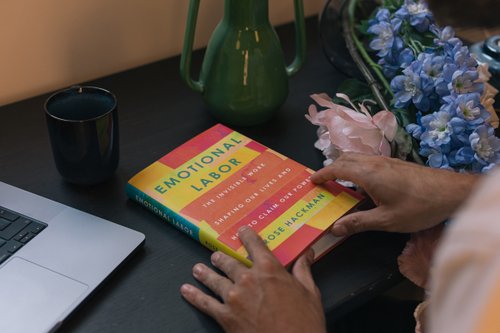10 ways to beat the Sunday Scaries
12 sept 2024
7 min


Freelance writer and translator, ex-recruiter
You’re having a perfectly relaxing weekend, you’ve hung out with your bestie, been to the gym, dabbled in some crafting, and then bam! Out of nowhere, you get this feeling creeping over you. You don’t know what to do with yourself, you can’t commit to anything because you’re restless and struggling to focus or you simply feel as though all of the energy has been sucked out of you. You may have a case of the “Sunday Scaries.”
The American Academy of Sleep found that around 80% of people find it harder to fall asleep on a Sunday night, meanwhile, other research shows that 7 in 10 people experience the Sunday Scaries. Many believe the phenomenon was exacerbated by the blurring of work/home boundaries during the pandemic, but is it something we now have to live with? Psychologist, coach, and author of Building Psychological Fitness, Karen Doll, shares her advice for coping with the Sunday Scaries.
What are the Sunday Scaries?
The Sunday Scaries are a form of anticipatory anxiety, which in layman’s terms means you’re worrying about something that’s about to happen. There’s no one-size-fits-all scenario when it comes to how you’re experiencing it. According to Doll, “People can feel distracted, people can feel lethargic, or kind of like the Sunday Malaise. So, people can either experience anxiety, like their nervous system is activated and they’re feeling restless and distressed, or they can feel [like they’re] languishing.”
What’s the cause?
There is no single factor that causes the Sunday Scaries. The symptoms can be caused by our heightened nervous systems telling us we’re in a threatening situation when really we aren’t. It’s an overactivation and the implications are grave, Doll says. “Having that elevated sense of distress leading to chronic stress can cause all kinds of mental, emotional, and physical challenges for us.”
The issue has also been exacerbated by the blurring of boundaries between work and home. “Covid-19 started the drift that work tends to fill into other spaces of our home, our lives, our time, our weekends and when people don’t get enough of a disconnect or a break, then we are not able to rest, recover and replenish. So, if our baseline level of stress is higher, then the Sunday Scaries are going to elevate that even more without a proper break.” However, this isn’t the sole cause. An overloaded schedule, a toxic workplace, a job you take no joy in, even an awful meeting at the end of the work week— all of these might give you a case of the Sunday Scaries.
Does it mean you hate your job?
Research shows that even people who love their jobs still experience the Sunday Scaries, so don’t start panicking and reaching for your resume. Doll shares that there are varying degrees of severity and intensity. “Some people might be mildly distracted, other people might feel some pretty significant anxiety, and so part of that is asking ‘how is it interfering with your daily life?’ Are you losing your Sundays? Is it impacting your relationships? Are you losing sleep?”
There is an element of activation that needs to take place for peak performance, but Doll explains that you need to figure out the difference. “What’s activation? What’s planning? What’s preparing? What’s dreading?” She suggests considering whether thinking about the upcoming week is helping or harming you in the moment. “Is this helping me show up more effectively? Is this constructive? Is this generating more stress for me? There is no research to support that more anxiety equals better performance.” In short, unpleasant emotions don’t need to be part of your preparation for work.
How serious is it?
Only you can judge whether the Sunday Scaries is an issue for you. In Doll’s words, “Our emotional experience is subjective, I can’t tell somebody how upset they are about something, they can only know that themselves.” If you’re not sure, Doll suggests finding some self-awareness and clarity on the issue.
Try asking yourself the following. “Is it getting in the way of daily functioning? Is it causing other physiological problems? Is it impacting how I’m eating or how I’m sleeping?” She adds that people often turn to food or alcohol to soothe their feelings and that for most people, the Sunday Scaries are probably in the mid-range of the continuum but she urges people to consider that although there may be an absence of illness, perhaps there is also an absence of health.
10 tips for banishing the Sunday Scaries
1. Set boundaries
As one of the key causes of the Sunday Scaries is the blending of our work and home lives, this tip should not come as a surprise. Doll’s advice? Having clear boundaries. Decide when you want to focus on work and when you want to disconnect.
2. Find energy boosters
Fill your off time with things that bring you joy and boost your energy levels. Doll says not to leave things to chance but craft our weekends and time off with intention. “If we leave it to chance, Sunday might come around and we don’t feel like doing anything.” If you let them, the Sunday Scaries can get in the way of your whole weekend. If you’re engaged in something that takes your attention and you know will make you feel good, it can keep intrusive thoughts at bay.
3. Make Mondays better
If you can figure out a way to transition yourself into the week more effectively, it might make it a bit less scary. There are always things you can do to make your day a little brighter, and Doll recommends you pack some of these things into your Monday so you have something joyful to look forward to. It doesn’t have to be a major event or anything that will drain your energy too much, but something that makes you happy.
4. Change the narrative
In the world of psychology, this is called cognitive reframing and it’s about looking at the messages you are reinforcing in one way or another. If worrying thoughts about work creep in, rather than telling yourself you are panicking about the working week, can you reframe that and notice you’re stressed about the working week? The subtle difference can just help you get a little more distance.
Here’s how to do it in 3 simple steps:
- Start by trying to catch yourself when unpleasant thoughts come in.
- Check to see if what you’re telling yourself is real.
- Try to challenge that thought with something slightly less scary.
It takes practice but it can make a real difference to your day.
5. Find distractions
Not every tip is going to work for everyone, and Doll says, “Sometimes, more thinking about our thinking is exactly what we don’t need to be doing at that moment.” If that applies to you, then you can look at trying distraction. Ruminating on negative thoughts will only make things worse.
Doll suggests you:
- Try putting your hand in cold water
- Take a cold shower
- Go for a run around the block
- Call a friend
Anything you think will short-circuit the unpleasant thoughts flying around in your head.
6. Talk to your manager
Talking to your employer might be beneficial, depending on the outcome you are seeking. Doll believes you need to know what you hope to gain from expressing your concern to your manager if you’re going to take this approach. There’s always a fear that something might count against you, but if you know the outcome could be beneficial it’s worth the risk. Doll says if you can identify what’s causing your stress, and it’s something your manager can help you with, you need to prioritize this step.
7. Take a planning break
For some people, spending 20 minutes checking email over the weekend might make you feel better and more in control, but this truly is not for everyone. We are all different and you need to figure out if this practice is truly helping you. Doll is an advocate of disconnecting completely, “As soon as we check email and get in, it can be hard to get out, and then all of a sudden we have more things to worry about. Now, if it helps to spend 20 minutes organizing and planning, then great. I think the challenge is getting in and out.”
8. Practice gratitude
There is a lot of research around the impact of gratitude and this extends to the workplace. If your workplace is mediocre, practicing gratitude can make a difference. Doll says to “Look at what is good. Ensure that we’re also shining the flashlight on what is good about our jobs because most jobs aren’t all bad. There are elements that can feel stressful or less pleasant but if we look hard enough, there should also be things that are good or gratifying or positive. “
An exercise to try: Reflect for a few minutes at the beginning of the day on what you appreciate about your job. Do this for 6 weeks and Dolls says it will lead to all sorts of positive work outcomes.
9. Be intentional and take small steps
As a general rule, Sunday or not, Doll recommends people be intentional with their time and attention. “We underestimate the importance of rest and we tend to be passive consumers in our leisure time, rather than practicing physical engagement or doing an activity rather than just leaving it to chance and binge watching TV. We might think it’s relaxing but it’s not really generative rest.”
Long-term change requires a culmination of lots of small steps. Think about setting up your environment to help you transition into the working week, what you can do to set yourself up for long-term success, and over time upgrading your relationship with work. However, if your work is truly dreadful, then Doll suggests that perhaps you listen to what that’s telling you. “Maybe there’s a job out there that could be a little less dreadful.”
10. Seek help
When in doubt, seek help. There are so many ways to get help: clinicians, therapists, coaches… You don’t have to have a diagnosable illness to reach out and get support. Everyone can use more people in their corner. Whether it’s support through a tough time or a transition period, Doll warns not to put off reaching out for the help you need. Going it alone is harder.
The workplace should be a source of well-being and flourishing not a source of stress. Everyone deserves that. Work environments need to become more open to discussions around demand and capacity, but it is also up to us to find our own balance. There is no one-size-fits-all answer, but you can be sure that you are not alone, and with conscious, dedicated effort, you will be able to beat the Sunday Scaries.
Photo: Welcome to the Jungle
Follow Welcome to the Jungle on Facebook, LinkedIn, and Instagram and subscribe to our newsletter to get our latest articles every week!

Más inspiración: Salud mental en el trabajo

‘We need each other’: Monika Jiang on combating loneliness in hybrid work
Hybrid work offers flexibility but can leave us feeling disconnected. Monika Jiang explores how we can rebuild workplace connections.
19 dic 2024

Struggling at work? Here are 3 steps to rebuilding your self-esteem
Low on confidence? Learn how reflection, recharging, and refocusing can help you rebuild self-esteem and thrive professionally.
27 nov 2024

Unpacking the burden of emotional labor
Rose Hackman’s "Emotional Labor" reveals how managing emotions impacts everyone, especially women and minorities.
08 ago 2024

Is financial anxiety harming your productivity?
Feeling overwhelmed by financial anxiety? You're not alone. Discover practical steps and expert advice to regain control of your work-life balance.
31 jul 2024

How to beat the post-PTO blues
Feeling down after a vacation is normal, but planning ahead and getting back into your routine can help beat those post-trip blues.
29 jul 2024

¿Estás buscando tu próxima oportunidad laboral?
Más de 200.000 candidatos han encontrado trabajo en Welcome to the Jungle
Explorar ofertas